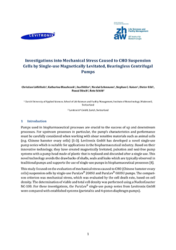Facts
Peristaltic- and 4-piston diaphragm pumps are based on mechanical contact between moving parts such as tube compression or valve interaction. Mechanical contact between moving parts can generate shear stress, which leads to reduced cell viability.
Levitronix® pumps have no mechanical contact between moving parts.
Test conditions
The Levitronix® PuraLev® 200SU and 600SU, a 4-Piston Diaphragm, and a peristaltic pumps’ shear stress generation were compared by observing their effect on respective cell viability. A fixed volume of CHO suspension cells was pumped in identical closed-loop configurations. The flow rate of each pump was set to 3.4 and 10 lpm, and backpressures of 0 – 0.5 bar, respectively. The cell viability was measured at selected times and compared.
Results
The cell viability did not change significantly for the PuraLev® 600SU during the entire test. The fluctuations are within an acceptable margin of error. In contrast, the 4‐piston diaphragm pump effected a significant decrease in cell viability in all tests.

Relative viable cell density at 3.4 lpm and 0.5 bar



